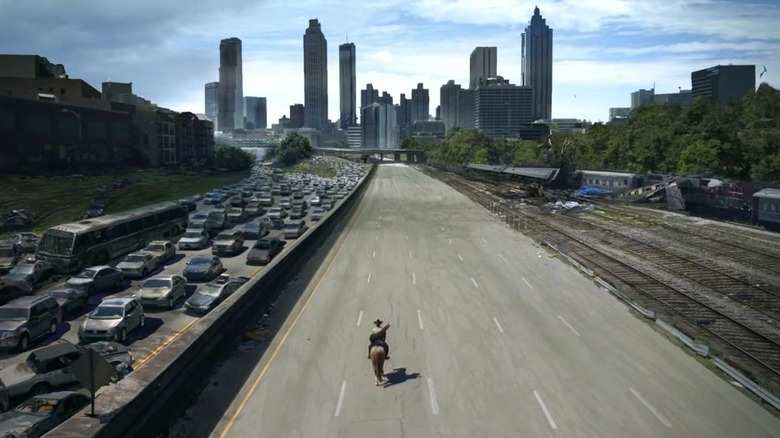The Massive Lie The Walking Dead's Creator Told To Get The Comic Published
Although zombies were popular throughout the late 2000s and 2010s, they were seen as largely played out when comic writer Robert Kirkman pitched "The Walking Dead." It was the early 2000s and the groundbreaking "28 Days Later" hadn't even been released in the United States. So, when Kirkman approached the comic publishing company Image with an idea for a black-and-white zombie series, it hesitated.
"When I pitched 'The Walking Dead' to Image, Jim Valentino and Eric Stephenson were running the company, and they both felt that 'The Walking Dead' as a straight zombie book didn't have enough of a hook to it," Kirkman explained in a 2007 IGN interview. It may seem silly in hindsight, but the elevator pitch for "The Walking Dead" is indeed sort of basic: It's a standard story about a group of survivors in a zombie apocalypse, with the main thing distinguishing it being its sheer longevity. "The Walking Dead" thrives because it lets its characters slowly evolve over the years, but that feature doesn't immediately stand out in the comics' first issue.
Kirkman's solution to this problem was to do a little of what he called "kind of fibbing" with the publishers. He told them that "The Walking Dead" wouldn't merely be a zombie story, but a zombie versus aliens narrative. As he explained:
"I had done a few books with them, so I felt comfortable doing this — I basically just lied to them and said, 'Well look, this is how it's going to be: The whole book is going to be as I pitched it, but as the issues progress, eventually I'm going to reveal that it was actually aliens who caused the zombie uprising. And it's going to be leading to this big battle between the humans and the aliens, and the aliens did this to kind of weaken the humans' military forces, and eventually it's going to be this big alien invasion.' And so they said, 'Oh yeah, that sounds sweet! Let's do that.' And so they approved the book based on that."
Kirkman doesn't feel too bad about making up The Walking Dead's zombies vs. aliens plot
It didn't take long for the publishers to realize Kirkman had lied to them, but by that point they no longer cared. Kirkman recalled that publisher Eric Stephenson had finished reading the first issue after it had been released; he said he liked it, but he hadn't noticed any hints about aliens being responsible for the outbreak. Kirkman then remembered telling Stephenson, "Oh well, I gotta be honest with you ... that stuff's not going to happen. I was kind of fibbing a little bit, and I really just want to do a straight zombie book."
"And at this point, the book was being pretty well-received and there was a lot of buzz about it," Kirkman continued. "So, Eric wrote back something like, 'Well that's good, because I was kind of reading the book thinking, 'Hey he might ruin this by putting aliens in it.”"
Kirkman noted that the other publisher who'd approved it, Jim Valentino, "wasn't too thrilled" to find out about the deception. Kirkman said he felt a little guilty telling this story to journalists because Valentino had been such a positive force behind his work on "Invincible," another long-running comic series by Kirkman that began shortly before "The Walking Dead" and has since enjoyed its own popular TV adaptation. Valentino is someone Kirkman had (and has) a lot of respect for.
"I feel bad telling that story because, like I said, it does Jim a disservice," Kirkman admitted.
He also remarked that people seem to love hearing this anecdote, likely for the same reasons people love to hear about how the first "Harry Potter" book was rejected by 12 publishers. It helps give the author a fun underdog narrative, and it contributes to the comforting idea that the people who reject us don't know what they're talking about. But as Kirkman made clear, the publishers' concerns about "The Walking Dead" had been reasonable. Throwing aliens into the mix would've been terrible, we all agree today, but back in the early 2000s it wasn't obvious at all.

